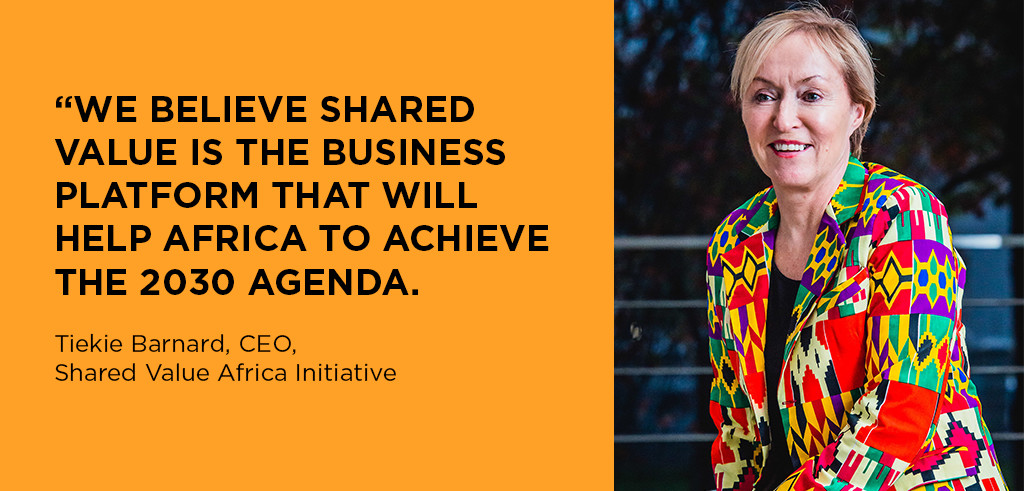What does shared value mean to you and why does it resonate so strongly?
I believe shared value is the change in business strategy that the developing world so needs. Coming firstly from a marketing and then an NGO and social development background, the lightbulb moment occurred when the realisation kicked in that government, NGOs and CSI will not be able to bring about change on their own. The support and assistance of the private sector is needed, and then Prof. Michael Porter and Mark Kramer reconfirmed it for me personally.
What led you to the shared value concept? How did you come across it?
I decided in 2014 to go back to studying and completed my Honours, writing my final research paper on shared value. Linking it to my marketing background, I tried to draw a conclusion through my research on what the marketing fraternity’s perception and understanding of shared value was. It was a bit of an eye-opener and a great learning experience.
What do you feel the opportunity of shared value is for business?
We believe shared value is the business platform that will help our continent to achieve Agenda 2030. The 2017 Better Business Better World report issued by the UN and the Business and Sustainable Development Commission highlight the major market opportunities in Africa. “Achieving the global goals will open an economic prize of at least US$1.1 trillion by 2030 for the private sector in Africa if we align to the global goals.” If business can look at these opportunities through a shared value lens, finding firstly the opportunity to create social impact, secondly identifying the business value, including the differentiating factor, and then establishing the feasibility of achievement and setting concrete goals. The opportunities are endless. Just look at the list of the companies in the Fortune Change the World List. Their working models are about creating business value and value for society in an integrated, holistic way.
How is business responding to the Shared Value Africa Initiative and what is the local appetite for shared value?
Business and executives are still confusing shared value with CSI, so we are working at addressing this misunderstanding. Some executives struggle with the moral dilemma of making money out of social issues. My question to those executives is: “so you would rather step back and do nothing?” Is the issue then not one of complacency? Having said that, the understanding is growing and as it gains traction Africa might just adapt the Porter-Kramer shared value framework to suit our context and economic challenges.
We are currently working very hard on growing the understanding and building a network of shared value businesses and supporting organisations across our continent. In 2019, the Africa Shared Value Summit is taking place in Kenya for the first time, so we can reach out to East and West Africa. It is our purpose to grow the continent’s appetite for shared value.
What do you think are some pertinent issues in Africa that could be solved through creating shared value?
Renewable energy is a big one, as access to electricity is still a big challenge for many countries in Africa. Being able to electrify the continent in a way that treads lightly on the environment would improve the quality of life for millions on so many levels. Access to electricity – and particularly to the internet, to information, to education, and so on – will empower people to take ownership of their own solutions, lift themselves out of poverty, join the workforce and thrive in the Fourth Industrial Revolution. Also key is access to information – giving people the ability to make informed decisions. Then there is agriculture, education and health – followed, of course, by the rest of the UN Sustainable Development Goals that we need to meet.
Can you share an example of a local business who has started on its shared value journey and give insight to the social issue/s it is working to address and how this will generate competitive advantage?
Discovery is one of our very own global shared value success stories and is a Founding Member of the Shared Value Africa Initiative. The insurance provider, whose head office is in Johannesburg and has a presence in 16 countries globally, started their shared value journey probably even before Prof Michael Porter and Mark Kramer formalised the business model. Discovery’s purpose is clearly defined – keep people healthy by encouraging them to exercise through incentives and, in doing so, address many societal issues that relate to our health, such as work absenteeism, productivity loss, hospital visits, and family pressures, to name a few. Discovery has demonstrated their competitive advantage over and over, making the business case for shared value demonstrably clear.
